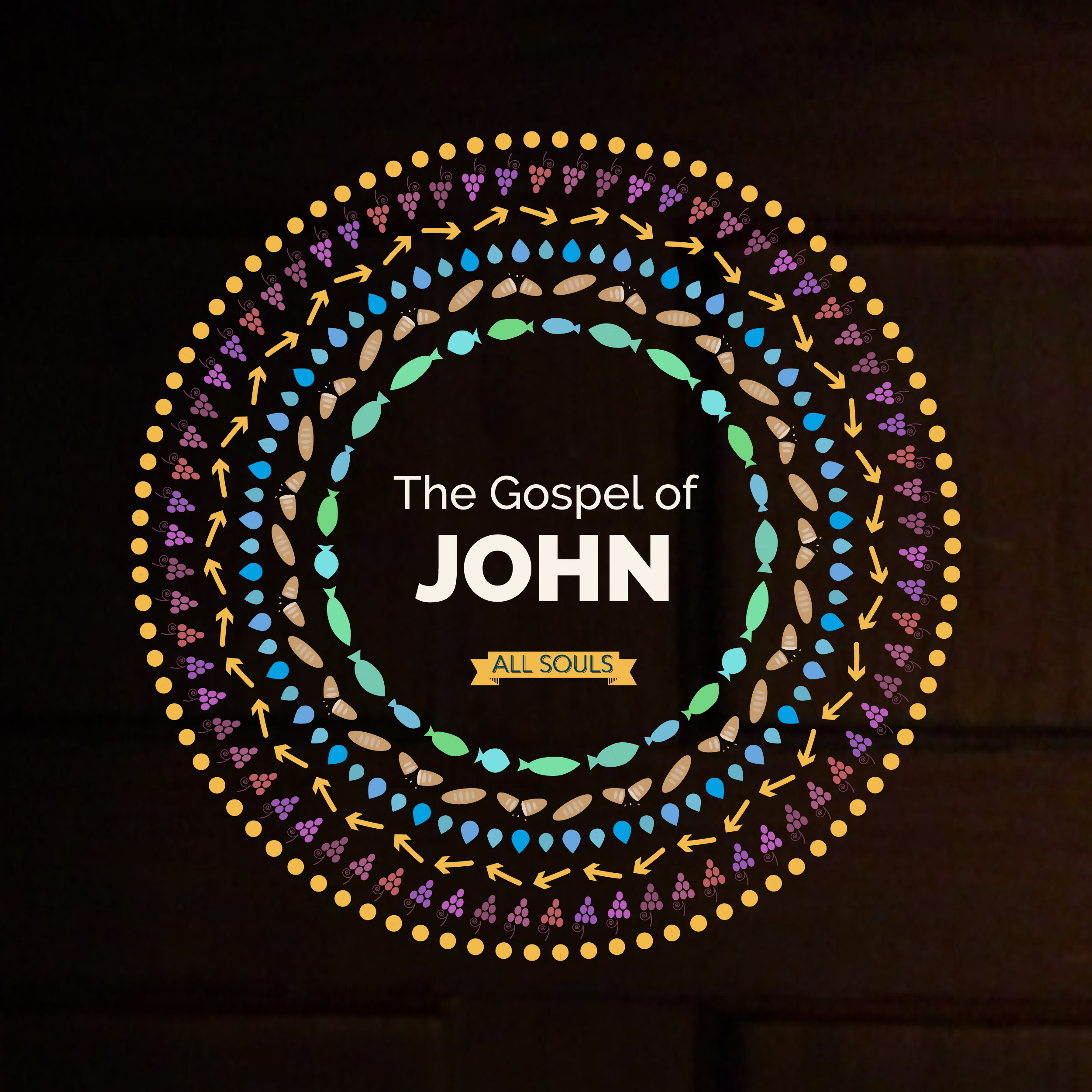
Sermon Series
The Gospel of John
September 2021 – Present
Pastor Luke Herche
John’s Testimony to Jesus
John 20:30–31; 21:24–25 • Pastor Luke Herche — Download
September 26, 2021
The Eternal Word
John 1:1–3 • Pastor Luke Herche — Download
October 3, 2021
The True Light
John 1:4–13 • Pastor Luke Herche — Download
October 10, 2021
We Have Seen His Glory
John 1:14–18 • Pastor Luke Herche — Download
October 17, 2021
Introducing Jesus
John 1:19–34 • Pastor Luke Herche — Download
November 14, 2021
Encountering Jesus
John 1:35–51 • Pastor Luke Herche — Download
November 21, 2021
The Joy of the Feast
John 2:1–11 • Pastor Luke Herche — Download
November 28, 2021
Intimacy 101
John 2:12–25 • Pastor Luke Herche — Download
December 5, 2021
You Must Be Born From Above
John 2:23–3:15 • Pastor Luke Herche — Download
December 12, 2021
The Father’s Love
John 3:16 • Pastor Luke Herche — Download
February 27, 2022
Come to the Light
John 3:14–21 • Pastor Luke Herche — Download
March 13, 2022
Not Your Story
John 3:22–36 • Pastor Luke Herche — Download
March 20, 2022
Crossing Barriers; Meeting Needs
John 4:1–18 • Pastor Luke Herche — Download
March 27, 2022
Worship in Spirit & Truth
John 4:19–26 • Pastor Luke Herche — Download
April 24, 2022
All Things Right for All People
John 4:27–42 • Pastor Luke Herche — Download
May 1, 2022
Taking God at His Word: The Ground & Growth of Faith
John 4:43–54 • Pastor Luke Herche — Download
May 15, 2022
Do You Want to Be Well?
John 5:1–15 • Pastor Luke Herche — Download
May 22, 2022
Father & Son
John 5:16–30 • Pastor Luke Herche — Download
May 29, 2022
Witness
John 5:31–47 • Pastor Luke Herche — Download
April 16, 2023
In the Wrong Place, For the Wrong Things
John 6:1–27 • Pastor Luke Herche — Download
Pastor Luke Herche preaches on John 6:1-27, showing who Jesus is, why we miss it, and how to see.
April 23, 2023
Food for Your Soul
John 6:25–59 • Pastor Luke Herche — Download
People know that they need to feed their souls. But the problem is, which of us really understands what that means? Where do we look? And what even is the “life” of the soul? In this sermon on John 6:25–59, in which Jesus makes the statement “I am the bread of life,” Pastor Luke Herche asks three questions and provides three answers:
· What does this life look like? Real life is the satisfaction of the soul.
· Where does this life come from? Jesus is the bread of life.
· And how do I get it? Come and feed by faith.
May 7, 2023
The Sermon that Emptied the Pews
John 6:35–71 • Pastor Luke Herche — Download
The message of the cross is offensive. It was offensive in Jesus’ day and it is perhaps more so today. When Jesus finished his sermon in John 6, all of his disciples left him except twelve. Why did some not believe? And how can we come to Jesus and find life? Listen as Pastor Luke Herche teaches on John 6:35–71, showing that the cross is scandalous, human wisdom fails, God gives life, and so we must look to Jesus and believe.
What’s in Your Way?
John 7:1–52 • Pastor Luke Herche
How does your approach to Jesus stop you from actually coming to Jesus? What is it about what you bring to... the table that gets in the way of seeing who Jesus is? In this sermon on John 7:1–52, Pastor Luke Herche shows that theological banter, worldly thinking, and self-centeredness all stop us from seeing who Jesus is. Rather, if you would know who Jesus is, you must choose the path of humble obedience, which is the path that Jesus took. He himself shows us that the path to greatness is through humility, and it is the suffering servant who becomes the glorified Son.
Rivers of Living Water
John 7:37–39 • Pastor Luke Herche
Are you thirsty in life? Do your job, your studies, your family, your friends leave you parched? Do the lives of... others on social media whet your thirst for something you don't have? It looks like it's out there, it looks like others are experiencing it, but you remain thirsty, needy, restless, wanting. In this sermon on John 7:37–39—the well-known passage in which Jesus cries out, “If anyone thirsts, let him come to me and drink”—Pastor Luke Herche looks through all of the Bible, from Genesis to Revelation, to show some of the beauty of God's artistry in the history of redemption recorded in the Scriptures, and ultimately to point us to Jesus as the one who pours out the Spirit as rivers of living water to satisfy the thirst of his people.
Knowing & Showing Grace
John 7:53–8:11 • Pastor Luke Herche
Are grace and obedience opposed to one another? When a woman is caught in the act of adultery... and brought before Jesus, we see Jesus’ gracious response, neither condemning the sinner nor condoning the sin. Listen as Pastor Luke Herche preaches on John 7:53–8:11 (with an introduction on text criticism!), identifying two common mistakes (grace is permissiveness; Biblical religion is legalism), offering a biblical corrective (know the depth of your sin; know the power of Jesus’ grace), and pointing us to a life of knowing and showing grace.
The Light of the World
John 8:12–30 • Pastor Luke Herche
We’re not big on “taking someone’s word for it.” We want to verify the facts, and when we can’t... do it ourselves we want some kind of independent verification. But if you test the veracity of someone’s word by appealing to a higher authority, at some point there is an authority above which you cannot go... so how can you test God’s word? How do we know Jesus’ words are true? Listen as Pastor Luke Herche preaches on John 8:12–30 (in which the Pharisees challenge Jesus’ claim to be the light of the world), providing three ways that we can know Jesus’ words are true: 1) the world makes sense in light of Jesus, 2) Jesus was sent by the Father, who is true, and 3) to know Jesus, look at the cross.
The Truth Will Set You Free
John 8:31–36 • Pastor Luke Herche
You’ve probably heard the phrase, “the truth will set you free.” But what does it mean?... When Jesus first spoke these words found in John 8:31–36 he wasn’t coining an aphorism, but making a bold, personal claim. Listen as Pastor Luke Herche gets to the bottom of what Jesus meant in this passage through three questions: Why do you need to be set free? What is the truth that sets you free? And when will the truth set you free?
Like Father, Like Sons
John 8:37–47 • Pastor Luke Herche
“Like father, like son,” “the apple doesn't fall far from the tree,” and “from a pumpkin comes a pumpkin” are all common expressions––well, maybe not that last one!––that help... illustrate the same truth: that a thing will reflect that which produced it. Jesus employs this logic in John 8:37–47 with some strong words for his hearers. Listen as Pastor Luke Herche preaches on this passage, providing the context (a story of two families), the principle (children are like their fathers), and the call (believe in the Son).
Greater Than
John 8:48–59 • Pastor Luke Herche
The apostle John wrote his gospel so that readers may believe that Jesus is the Christ, the Son of God, and, by believing, have life in... his name. This makes the question of who Jesus is very important—even a matter of life and death. So what makes Jesus different? What makes him different from the teachers and founders and philosophers of other great religions of the world? What makes him even greater than Abraham, “the father of all who believe”? Listen as Pastor Luke Herche teaches from John 8:48–59, showing how Jesus is “greater than” in three points: Jesus speaks the words of the Father, Jesus fulfills the promises of the Father, and Jesus is one with the Father.
Who Sinned?
John 9:1–7 • Pastor Luke Herche
Why? It’s a question we ask often, in response to national tragedies, global pandemics, brutal racism, personal... devastation. Why me? Why now? Why this? We want answers. And answers, more often than not, mean determining blame. In John 9:1–7, the disciples ask Jesus a question: “Who sinned, this man or his parents, that he was born blind?” They want to know why. They want to know who to blame. Jesus, of course, rarely answers a question in the given parameters. Very often Jesus is given two options and he persistently chooses a third. Listen as Pastor Luke Herche preaches on this passage, looking at the question of who sinned, under four headings: the situation (there is tragic suffering in the world); the presupposition (suffering is a result of personal sin); Scripture’s correction (suffering is an opportunity to display God’s works); and the climax (Jesus enters suffering and overcomes it).
Blurred Vision
John 9 • Pastor Luke Herche
In John chapter 9 Jesus accuses the Pharisees of not being able to see what is right in front of... their faces, and he says, because of that, their guilt remains. Unlike the physically vision-impaired, these religious leaders are blind to their own blindness—which is about as blind as you can be!—and they are culpable for it. Listen as Pastor Luke Herche preaches on this passage, showing us four things which blur our vision: looking to rules vs. seeing your sin, looking to other people vs. accepting rejection, looking down on other people vs. admitting common lowliness, and looking to intellect vs. embracing the folly of the cross.
The Good Shepherd
John 10:1–18 • Pastor Luke Herche
As you read through the scriptures you often find this tension: when there was no king in Israel, everyone... did what was right in their own eyes; when there were kings, the kings were corrupt. No one in charge led to anarchy; kings and rulers led to an abuse of power. But in Ezekiel 34, God’s promised solution is both that he would be the shepherd of his sheep and that he would set up a ruler in the line of King David. This is the context of John 10, in which we find that God’s fulfillment of this promise is found in Jesus—the son of David according to the flesh, the Son of God from all eternity—coming to shepherd his people as the Good Shepherd. In this sermon on John 10:1–18, listen as Pastor Luke Herche expands on this under four headings: The Voice of the Good Shepherd, The Purpose of the Good Shepherd, The Method of the Good Shepherd, and The Flock of the Good Shepherd.
Safe in the Father’s Hands
John 10:19–42 • Pastor Luke Herche
Terrorist attacks, natural disasters, sickness, disease, and war. The possibility that things could fall... apart at any moment makes us feel afraid. Or maybe it’s the little things in life, the things that you imagine you can control, that make you anxious. Whether you are afraid of the big things or the little—or if you are living in blissful ignorance of it all—hear the message of our text this morning: we can rest safe and secure in the hands of Jesus, because he and the Father are one. Jesus promises us safety: no one can snatch you out of the Father’s hands. And Jesus can back up that promise because he and the Father are one—he has proven his relationship to his Father by the works he has done. Listen as Pastor Luke Herche preaches on John 10:19–42, looking at the demand, the snag, the promise, the claim, and the evidence.
The Love of Christ
John 11:1–44 • Pastor Luke Herche
Alfred Lord Tennyson famously wrote, “’Tis better to have loved and lost than never to have loved at all.” Whether you... agree or disagree with this saying, it does reveal something true: sometimes pain is better than no pain. And sometimes love is the cause of that pain. In John 11, Jesus’ ministry comes to a climax of sorts with the raising of Lazarus from the dead, and through this account we can see several facets of the love of Jesus. Listen as Pastor Luke Herche shows how love sympathizes with, love seeks the good of, and love suffers for.
Promise & Power
John 11:1–44 • Pastor Luke Herche
When was the last time you were moved emotionally? Maybe you cheered at a touchdown or cried at a heroic gesture. Many things... in life move us to weep or to shout for joy—but what about the gospel? Have we heard the incredible stories in God’s Word so many times that they have become mundane to us? Or is it that we are more interested in finding life and fulfillment in this age, rather than looking forward to the life that transcends death? Listen as Pastor Luke Herche preaches on the raising of Lazarus in John 11:1–44, exhorting us to stop seeking life in this age and to believe the promises of life in Jesus, because we have seen Jesus’ power over death itself.
Why Seeing is Not Believing
John 11:45–57 • Pastor Luke Herche
What gets in the way of you seeing Jesus for who he really is? Some people think that if they could only see Jesus and his miracles for themselves,... then they would believe. But the truth is that ‘seeing’ is not the answer, and more facts don’t lead to more faith. We already have plenty of evidence—the heavens themselves declare the glory of God! So if seeing isn’t the answer, what is? Listen as Pastor Luke Herche teaches from John 11:45–57, drawing out four important truths: First, not everyone who sees believe. Second, fear stops us from seeing rightly. Third, fear causes us to sabotage ourselves. And fourth, only Christ’s love can cast out fear.
Lavish Devotion to Jesus
John 12:1–8 • Pastor Luke Herche
What has your attention? What has your love? Your loyalty? Your enthusiasm? What are you devoted to? What is the object of your lavish... devotion? There may be many answers to these questions, but in the end there are only two real options: devotion to Christ or devotion to self. This is the dichotomy presented by Mary and Judas in John 12:1–8, in which Mary anoints Jesus’ feet with an expensive perfume. Listen as Pastor Luke Herche preaches on this passage, showing us the object of lavish devotion, the act of lavish devotion, the challenges to lavish devotion, the practice of lavish devotion, and the motive for lavish devotion.
Sir, We Wish to See Jesus.
John 12:9–26, 31–33 • Pastor Luke Herche
Who is Jesus? People have all kinds of different ideas about him, often whatever best supports their own agendas—everything from... an enlightenment thinker to a civil rights protester to a present-day hipster. Everyone wants to remake Jesus in their own image. But all of these distorted versions of Jesus leave people confused about who he really is. In John 12, we find a diverse crowd of people interacting with Jesus, and the one thing they all have in common is that they don’t yet see Jesus for who he is. Listen as Pastor Luke Herche preaches on John 12:9–26, 31–33, probing possible answers to the question, “Who is Jesus?” (A wonderworking spectacle? A nationalistic hero? A bitter rival? An enigmatic puzzle?) and finally concluding that only when we see Jesus as the Lord who is lifted up will we come to see him for who he really is.
Pursue Glory
John 12:20–33 • Pastor Luke Herche
In John 12:20, Jesus says that the hour has come for the Son of Man to be glorified. But what does it mean to be glorified? Why is it so... important? In this sermon on John 12:20–33, Pastor Luke Herche preaches on the glory of Jesus Christ, showing us the time of Jesus’ glorification, the method of Jesus’ glorification, the purpose of Jesus’ glorification, the fruit of Jesus’ glorification, and the pattern of Jesus’ glorification.
Three Barriers to Belief
John 12:34–50 • Pastor Luke Herche
Where are you at spiritually? Perhaps you are someone who struggles to believe the doctrines of Christianity. Something is standing in your... way—but what? What’s stopping you from believing the claims of Christ? In today’s sermon text from John 12 we find three barriers/obstacles/hindrances to belief: confusion (“I just don't understand”), arrogance (“I know better”), and apathy (“Who cares?”). Listen as Pastor Luke Herche addresses each of those barriers in turn, showing us what to believe, what gets in the way, and why it matters.
Blessed if You Do Them
John 13:1–20 • Pastor Luke Herche
In John chapter 13, Jesus washes the feet of his disciples, demonstrating that Jesus comes as a servant and calls... those who follow him to serve. Listen as Pastor Luke Herche preaches on this astonishing passage, teaching us to serve, not from a place of insecurity, but of confidence, not just our friends, but our enemies, and not as something optional, but as fundamental to discipleship of the Servant King.
The Love of Christ
John 13:21–38 • Pastor Josué Pernillo
The Gospel of John is the gospel written by a friend. John was someone who walked with Jesus, knew him, ate... with him, saw the miracles. There are details in the gospel of John not seen anywhere else, as well as a more intimate, personal look at Jesus. In John 13:21–38 we see, from his friend, the love of Christ on display, even framed by the betrayal of Judas and the denial of Peter. Listen as Pastor Josué Pernillo preaches on this passage, showing us how Jesus calls his disciples to love others, reflecting Christ, and following him even through failure.
Comfort in Our Father’s House
John 14:1–11 • Pastor Luke Herche
Where do you need comfort right now? Be it political tensions, trouble at work or at home, or even the turmoil of... your own heart—what is going on in your world that is upsetting? In John 14, Jesus begins with the comforting words, “Let not your hearts be troubled.” Listen as Pastor Luke Herche preaches on this passage, addressing three questions: Why do we need comfort? Where do we find comfort? And how do we get there?
Greater Works
John 14:12–14 • Pastor Luke Herche
The night before he was crucified, Jesus told his disciples that, following his ascension, whoever believes... in him will do the works that Jesus did and even “greater works than these.” Listen as Pastor Luke Herche preaches on John 14:12–14, focusing on the “greater works” and discussing when they will be done, who does them, what they are, how they are done, and why they are done.
Long Distance Relationship?
John 14:15–26 • Pastor Luke Herche
How do you relate to Jesus? How do you relate to Jesus when he is not here, physically, when you can’t see his face, hear... his voice, or touch the scars on his hands? That was clearly a question in the early church. From a secular perspective, the church had a PR problem. They said Jesus had risen from the dead, but if so, where was Jesus? We invite people into a relationship with Christ, but where is Christ? We answer, rightly, that he is in Heaven. But what does it look like to have a relationship with someone who is in Heaven? Listen as Pastor Luke Herche preaches on John 14:15–26 showing that in a reciprocal, post-resurrection relationship with Jesus we love him as we keep his commandments, and he loves us by coming to us by his Spirit and speaking to us in his Word. Therefore, we keep his commandments, delight in his presence, and stay in his word.
Let Not Your Hearts Be Troubled
John 14:27–31 • Pastor Josué Pernillo
Where do your fears take you? Fear and worry are part of our daily lives. Everybody has fears. And everybody... responds to fears in different ways. Some sweat, others get quiet or make jokes. But where do your fears drive you to? And how do they play out in your day-to-day? In John 14:27–31, we find Jesus teaching his disciples for the last time before his crucifixion, and here he begins to strike at their fear and anxiety, telling them, “Let not your hearts be troubled, neither let them be afraid.” Listen as Pastor Josué Pernillo preaches on this passage, showing that in the midst of his counsel to his fearful disciples, Jesus gives them his peace and instills them with confidence because he loves the Father.
Quotation from the ESV.
Abiding Fruitfulness
John 15:1–8 • Pastor Luke Herche
God wants you to be fruitful. This is no minor theme, but is fundamental to God’s purposes for creation. God wants... his creation to reflect something of his own vitality, his abundance, his fruitfulness. But do you feel fruitful? Or do you feel dry? Parched? Barren? In John 15, we find Jesus teaching on the true vine and the branches, setting up his disciples for a lifetime of fruitfulness. Listen as Pastor Luke Herche preaches on John 15:1–8, addressing three questions: What does it mean to bear fruit? How do we bear fruit? And why should we bear fruit?
The Secret of a Happy Life
John 15:9–17 • Pastor Luke Herche
Christ invites us into a community of love. Listen as Pastor Luke Herche preaches... on John 15:9–17, teaching us to abide in Christ’s love as we know his love, imitate his love, depend on his love, and delight in his love.
If the World Hates You...
John 15:18–16:4a • Pastor Luke Herche
Why is there so much fighting in the world? Why so much animosity? And where did it come from? Listen as... Pastor Luke Herche preaches from John chapter 15, addressing two questions: First, must there be animosity? And second, what should be our response?
The Work of the Holy Spirit
John 16:4b–15 • Pastor Josué Pernillo
Listen as Pastor Josué Pernillo preaches on John 16:4b–15, showing that Jesus sent the... Holy Spirit for our advantage because the Spirit takes what is of Christ and applies it to us to the glory of God.
Take Heart
John 16:16–33 • Pastor Luke Herche
In the midst of your trouble and confusion, you don’t have to hide. Jesus knows your... questions. In the midst of your trouble and confusion, God is at work. Your sorrow will turn to joy. In the midst of your trouble and confusion, your Father hears your cries. You can go to him. In the midst of your trouble and confusion, don’t think you’ve got it all figured out. Rest in the victory of Jesus. Learn more in this sermon from Pastor Luke Herche on John 16:16–33.
Pursue Glory
John 17:1–5 • Pastor Luke Herche
Do you know what glory tastes like? Everything has glory, and all the glory of created things is really a reflection of the glory of... the Creator. Whatever is marvelous in the world comes from the hand of God. When we taste, see, smell, touch, hear something beautiful we taste glory. But what glory are you pursuing? And how is it shaping your life? Pastor Luke Herche preaches on John 17:1–5, exhorting us to pursue God’s glory as we see through the text that God pursues his own glory, Jesus displays God’s glory, and life is knowing God’s glory.
Want to go deeper? Take some time to reflect on the sermon with the following questions:
What is glory in general? How do you think about it? Where do you see it in general?
How do you feel about the phrase, "God pursues his own glory?" What might feel off about it? How do you resolve that in your thinking?
How does it change things to know that the greatest display of God’s glory is the display of his love in the cross?
What are the different things it might mean that life is knowing God’s glory? How have you tasted/do you taste God’s glory? What might you do if you don’t?
Our Place in the World
John 17:6–19 • Pastor Luke Herche
“Finding your own place in the world” is something everyone pursues, consciously or unconsciously. But it is really... knowing where you are and whose you are and why you are that gives you the freedom to be who you are in the world. Listen as Pastor Luke Herche preaches on John 17:6–19, helping us to better understand our place in the world by answering four questions:
Where are we? In the world.
Who/se are we? Treasured by God.
How are we? Kept and consecrated.
Why are we? Commissioned by Christ.
– – – – – – – –
Want to go deeper? Take some time to reflect on the sermon with the following questions:
Describe the relation between the disciples and “the world.” How does that need to be nuanced?
How does it feel to know that you are part of God’s treasured possession (Ex. 19:5–6; 1 Pt. 2:5)? What are some ways that can be misunderstood? What should it engender in us as God’s people?
How is being chosen, kept, and consecrated sometimes pitted against being commissioned? How do they actually go hand in hand?
What are some specific ways that you can be salt and light where you live, study, work, and play? Take some time to pray to that end and for particular people who need to see and know the glory of God’s grace in Jesus.
Jesus’ Biggest Prayer For You
John 17:20–26 • Pastor Ethan Brown
What does Jesus want for his disciples? Nothing less than for us to share in the divine life of the Trinity: to... know and experience the life and love that God has shared as Father, Son, and Spirit from all eternity, something we can experience if we are in him and he in us. Listen as RUF Campus Minister Ethan Brown preaches on John 17:20–26, showing us the union we can have with God, the communion we can have with his people, and the commission given to us as we go out into the world.
– – – – – – – –
Want to go deeper? Take some time to reflect on the sermon with the following questions:
What role does mystery and wonder play in your understanding of God? What is one way you want to pursue adoring the incomprehensible God this week?
Growing as a Christian means growing in loving what Jesus loves, and Jesus loves God, the Church, and the lost. Which of these loves of Christ do you see strong evidence of in your life? Which of these loves do you want to see grow in the coming weeks?
Jesus prays for you. Spend some time reflecting on this beautiful truth – and then spend some time praying for someone in your life that you want to know the superabundant life of God.
Facing Hard Things
John 18:1–11 • Pastor Luke Herche
When you face difficult things, how do you respond? Sometimes we run, sometimes we blame others, sometimes... we fight, sometimes we look for distractions. We do these things because we are afraid—afraid of what is to come, of dealing with our guilt, of facing God’s call, of life not working out. In this sermon on John 18:1–11, in which Jesus is betrayed and arrested in the garden of Gethsemane, Pastor Luke Herche shows us that while our own temptation is to hide and blame and save ourselves, Jesus stepped up to protect his people by giving his life, which means we don’t have to be afraid. We can rest secure in Jesus, own our sin, and be bold to face hard things in life.
– – – – – – – –
Want to go deeper? Take some time to reflect on the sermon with the following questions:
How does Jesus in the garden of Gethsemane compare to Adam in the garden of Eden? What is similar? What is different? What feels ironic?
What do you/people tend to do when faced with hard things? Why do you/people respond in that way?
How does Jesus’ work in the cross and resurrection free us and encourage us to face hard things (whether those hard things have to do with dealing with our own sin, facing trials, or stepping out into God’s call on our lives)?
Who do you know who needs to hear about Jesus’ work in facing the cross for us that we might be able to face the hard things that come our way? Take some time to pray that God would give you an opportunity to speak to that person about Jesus and his work.






